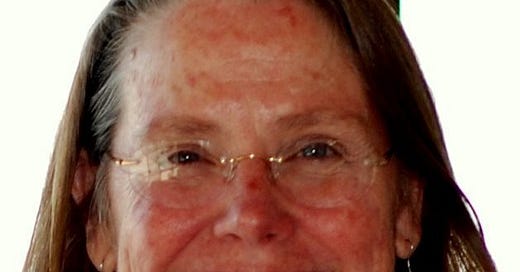Never stop learning
Sue inspired me with her commitment to lifelong learning as a path to personal, spiritual, and organizational growth.
When Sue and I worked together, I was technically her supervisor. However, Sue rarely needed supervision. She came into the position of Faith Development Director for the Southeast District of the Unitarian Universalist Association (UUA) fully formed—experienced and knowledgeable. In fact, Sue is one of the most knowledgeable people I know, not because she’s a genius, although she very well could be, but because of how much she reads. And it’s not only the quantity of reading she does, but how she absorbs and then freely shares what she reads with others.
Sue is the model of a lifelong learner. It’s appropriate then that she has spent much of her career promoting lifelong learning for others. She made this commitment because the lack of adult faith development offerings in the congregations and other faith groups she worked with distressed her. She found that adults generally considered it important to educate children in their faith tradition, but that was often done at the expense of adult education.
Based on her considerable research on the topic, Sue believes that if adults aren’t encouraged to examine what they believe at various points in their lives, their faith development, i.e., their values and morals, gets stuck in a childhood belief system that is incompatible with the complexities of adult life. This is why Sue has committed her life to developing opportunities for people 18-108 to move beyond the simplicity of the stories and rituals they learned as children to a deeper understanding of what they believe and why.
As a spiritual director and minister, Sue continues to this day to focus much of her work on individual spiritual development. However, while we were working together, she also found ways to apply her knowledge to groups. Sue challenged the board members of our small organization to examine how their individual beliefs and the collective mindset in the organization combined to make it difficult, if not impossible, to make tough decisions, especially decisions that would upend the status quo.
Focusing on the work of Robert Kegan and Lisa Laskow Lahey, authors of Immunity to Change, Sue gently pushed the board to examine themselves individually and collectively. Because she started by teaching a well-respected business method, she won board members’ confidence and helped them see how their personal insecurities and desire for comfort inhibited the board’s ability to act boldly.
Although not everyone accepted the premise, enough did to make it possible for the board to make decisions that had far-reaching implications, especially regarding their commitment to racial equity and inclusion. These changes wouldn’t have been possible without Sue’s confidence that by sharing her knowledge and challenging board members to look deeply at themselves, meaningful change was possible.
I don’t remember her exact words, but I remember how when the board chose to stay quiet on a controversial issue related to the fact that the organization was named after an unrepentant slaveholder, Sue asked them to consider what they most feared about taking a stand. As each person went around the room and stated their individual fears, they came to understand they were not alone. With this realization, they found the collective courage to take a leadership role in supporting what was eventually a successful change.
Sue taught me effective ways to use teaching, rather than preaching, as a non-threatening approach to challenge those in positions of power to look at themselves individually so they can move forward collectively to do what needs to be done. This learning has served me well in my work with other organizations. I just wish I could quote the resources as assuredly as Sue can.
Next post:







Let’s hear it for Sue!